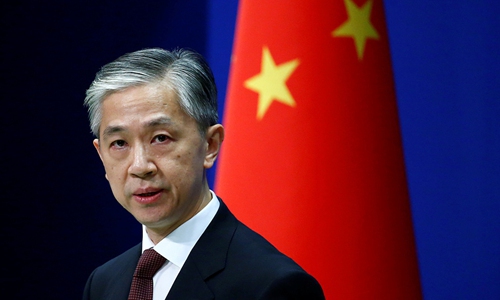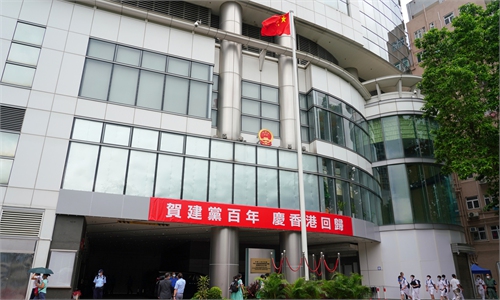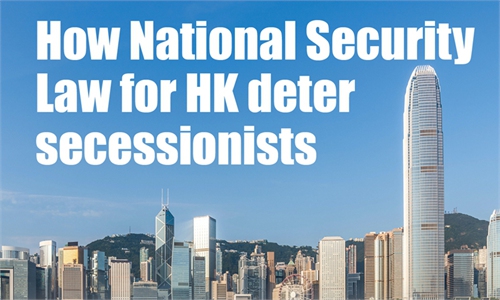GT exclusive with Lau Siu-kai: Centennial celebration an opportunity for CPC's 'desensitization' in Hong Kong
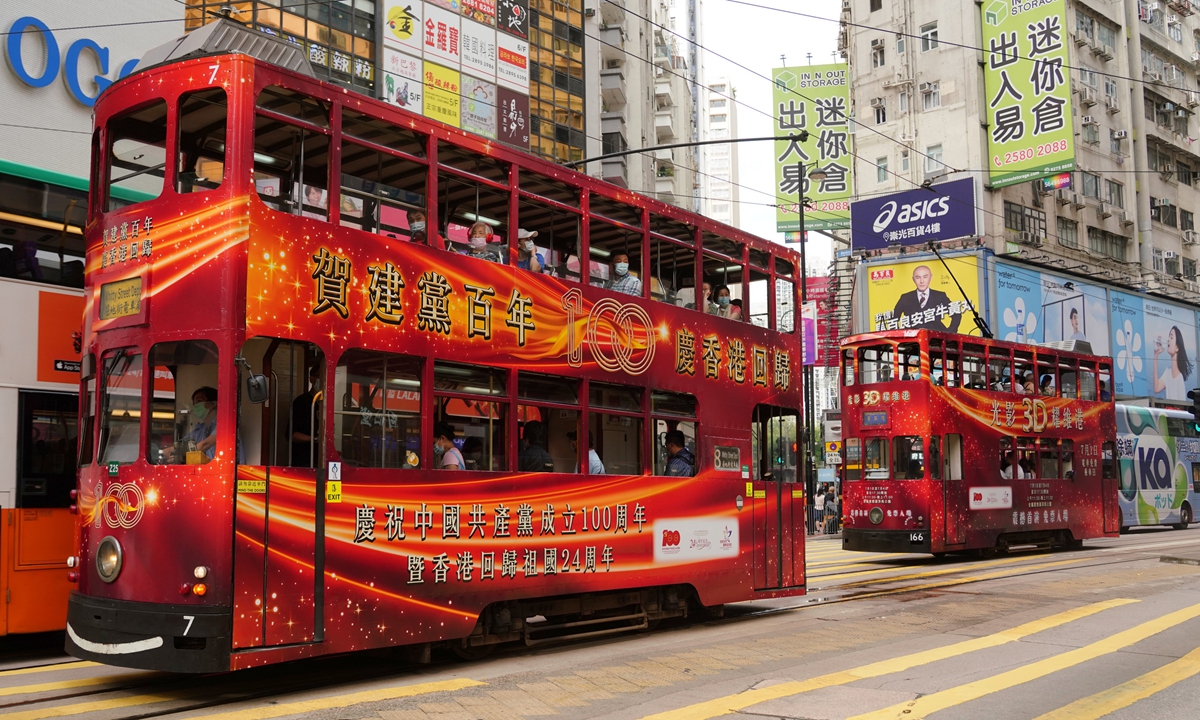
Themed trams celebrating the centennial of the CPC's founding are seen in Hong Kong. Photo: VCG
Editor's Note:
Just ahead of the centennial celebration of the founding of the Communist Party of China (CPC), the Hong Kong Special Administrative Region (HKSAR) marked the 1st anniversary of the implementation of the National Security Law for Hong Kong.
After social turmoil hit Hong Kong in 2019 when separatists used the public's misunderstanding of the CPC to incite hatred, the implementation of the National Security Law helped Hong Kong restore social order, and has made people realize that the CPC is the creator and guardian of the "one country, two systems," and has been safeguarding Hong Kong over time. However, the CPC's presence in the city appears to be extraordinarily low-key, or somewhat "invisible," and for a long time in the past, Hong Kong society has rarely discussed it openly.
After going through its darkest moments in 2019 and getting back on track, how should Hong Kong society rebuild its understanding of the country's ruling party? Global Times reporter Bai Yunyi (GT) spoke with Lau Siu-kai (Lau), deputy head of the Chinese Association of Hong Kong & Macao Studies, in an exclusive interview.
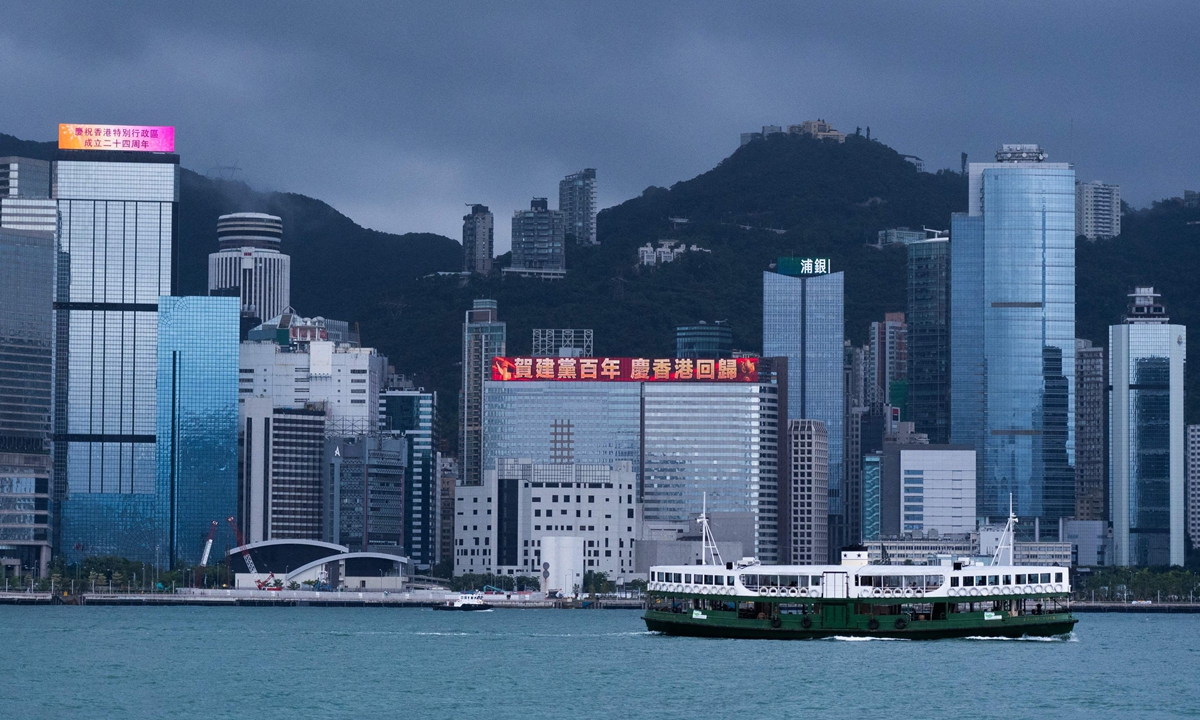
A ferry passes through an LED board displaying a slogan celebrating the 100th anniversary of the founding of the CPC and the 24th anniversary of Hong Kong's return to the motherland in Hong Kong. Photo: VCG
GT: In your opinion, what does Hong Kong need to do most for the 100th anniversary of the founding of the CPC?
Lau: Whether it is the SAR government, society or individuals, they should correct their one-sided, outdated and wrong understanding of the CPC over the past few decades, and reshape their perception of the Party and the country.
Today, Hong Kong is halfway through its "one country, two systems" policy, which will remain unchanged for 50 years. If "refusal," "confrontation," or even "hostility" toward the CPC resurfaces in Hong Kong in the second half, it will not only have a very negative impact on Hong Kong and the central government, but can also be easily used by the US and other countries to make a fuss to degrade China's image on the global stage. Under such circumstances, it will be difficult to fully and accurately implement "one country, two systems."
GT: What are the misunderstandings about the CPC that have long existed in Hong Kong society? What is the root cause? How can we dispel these perceptions and reconstruct Hong Kong's understanding of the CPC?
Lau: The main problems lie in Hong Kong society's inability to correctly understand modern Chinese history or its own, to shake off the demonized narrative of CPC by some Western forces, and to understand the importance of CPC in the region's development, where they are a community of shared interests and destiny.
As for the root cause of these problems, it's partly because some of the older generation came to Hong Kong to escape the Party in their early years. They hold an anti-communist ideology, and some even monopolized public opinion through education, media, religion and other platforms to inculcate a one-sided wrong idea among younger generations.
Some of the resistance in Hong Kong comes from the "imbalance" they have felt when ideological conflicts occur domestically and internationally, as China is developing rapidly.
This has caused some people who had always "looked up" to the West to grow vigilant toward the mainland, as the ones they used to "look down on" are now becoming more powerful, and that makes them feel at a loss, unfair, and unacceptable.
What's more, after Hong Kong's return to the motherland, it did not implement proper education on the history, development, and constitution of its country, let alone a correct perception of the CPC. The historical reason behind it was that the central government saw some resistance in the Hong Kong people after its return, and therefore decided not to openly arrange public activities in the region.
However, the decision has led to the fact that the Party has become increasingly "mysterious" in Hong Kong, and any Party-related topics were avoided in public discussions, therefore the misconceptions were passed on from generation to generation to a stage so serious that it needs to be resolved immediately.
GT: Will the CPC's presence in Hong Kong be "desensitized" in the future? Is the centennial of the Party's founding an opportunity for this?
Lau: The CPC is the ruling party of China, which includes Hong Kong, but its governance of Hong Kong is through the Basic Law.
In the past 24 years, the Party has stayed low-key in the region. Even at today's Party centennial, celebrations are still being held in the name of the government. However, the situation needs to be changed, and the CPC should not be as sensitive in Hong Kong in the future.
In fact, the 100th anniversary of the founding of the CPC has considerably shown its existence to the local people. Until now, major anti-China figures have been restrained by the National Security Law, and there won't be any large-scale opposition like before.
The city's political life has entered a new phase. The future governance will surely be combined with both governance of the central government over Hong Kong and high autonomy of the HKSAR government.
Although the CPC still won't directly participate in specific affairs in Hong Kong society, its spirit will be manifested through the Constitution. There is no reason why the CPC in Hong Kong should not be seen, nor does it need to hide its existence.
GT: How would you summarize the changes in the central government's approach and policies for governing Hong Kong in the past two years? How effective have they been?
Lau: In the past two years, Beijing's approaches toward Hong Kong have undergone significant changes. Under the interference of external forces, Hong Kong had become increasingly alienated from and even confrontational to the central government, and had seriously deviated from the track set by "one country, two systems."
Therefore, the CPC must make adjustments different from the tolerant policies adopted before, in the direction of curbing secessionist forces from inside and out, sending out strong signals of more decisive measures from the central government to deal with affairs in Hong Kong, carrying out reforms in Hong Kong's judicial system, and building patriotic forces in the region.
So far, the rigorous actions have received the expected results with less resistance than I had thought. Extreme opposition forces have been crushed, and the little sympathy and support from society has disappointed them.
GT: Will the role of the central government's liaison office and other authorities in Hong Kong change in the foreseeable future?
Lau: As the representative of the central government in Hong Kong, the Liaison Office will play its due role in executing its political functions and participate more actively in Hong Kong's affairs to support the SAR government against external forces, and promote Hong Kong's integration into the overall development of the country.
GT: There have been major personnel changes recently in the SAR government. Considering the imminent shift of office, what changes will be expected for the next SAR government's personnel structure and governance?
Lau: The next SAR government needs people with greater loyalty to the country, greater courage and more innovative spirit in various fields and sectors to join the team.
The new government will definitely face resistance from certain opposition forces or interest groups. In addition, although the National Security Law has come into effect, maintaining regional stability is still the top priority in the SAR work. All these factors require the new governance team to take a decisive attitude that will not always comply with so-called "public opinion" created by certain groups of people.
The new SAR government also needs to work closely with the central government on the long-term planning of Hong Kong that could combine the region's needs with the country's major policies.
Global Times
